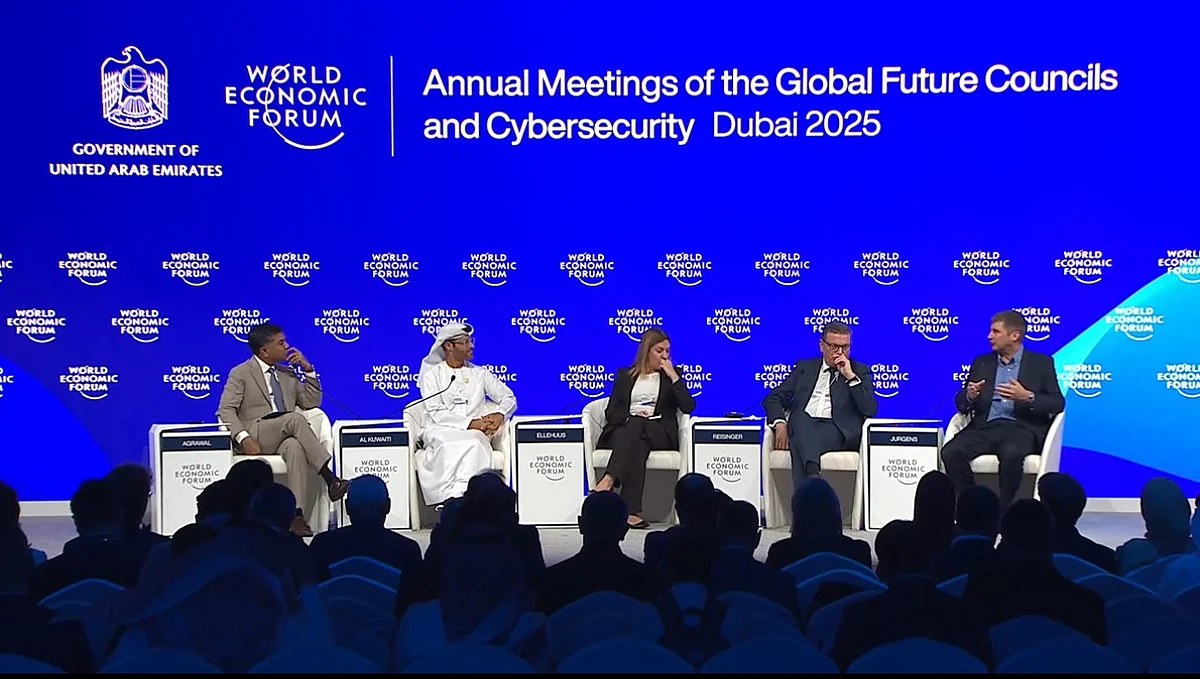
'AI Is The New Oil,' Says Top UAE Cybersecurity Official, Urges Private Sector Alliance
Artificial intelligence is“the new oil” for the UAE, according to Mohamed Al Kuwaiti, Head of Cybersecurity for the United Arab Emirates Government, who outlined the nation's comprehensive strategy for harnessing AI's transformative power across all sectors.
Speaking during 'The New Cyber Order: Cooperation Amid Turbulence' session at the World Economic Forum's Annual Meetings of the Global Future Councils and Cybersecurity, Al Kuwaiti affirmed the technology's critical role in the nation's future.
Recommended For You“AI is a new oil for so many sectors that we already have,” Al Kuwaiti stated.“And it could change a lot of the ways that we see and deal with technology. It does not only make things convenient for humanity."
Stay up to date with the latest news. Follow KT on WhatsApp Channels.
Transforming lives through AIThe cybersecurity chief highlighted AI's profound impact on people of determination, demonstrating how the technology extends far beyond convenience into life-changing applications.
He explained how AI has made it easier for them to hear, see, listen, walk, and perform many other functions, particularly in the healthcare sector.
In the cybersecurity domain, Al Kuwaiti described a dual relationship between artificial intelligence and digital defence.“AI is our domain for cyber security. We always say AI for cyber or cyber for AI,” he said.
Five pillars of UAE's national strategyAl Kuwaiti detailed the UAE's National Cybersecurity Strategy, which rests on five fundamental pillars designed to maximise AI's benefits while ensuring ethical and secure implementation.
The first pillar is partnership, followed by building technology and leveraging it for the benefit of humanity. The third pillar focuses on innovation - moving beyond conventional legacy systems and teams to think outside the box about how to use AI beneficially.
The fourth pillar centers` on the core mission: to protect and defend in an ethical way. The fifth pillar is governance, encompassing policies, legal frameworks, legislation, procedures, and guidelines.“We need to govern, we need to have those legislations, procedures, guidelines, you name it, any of those aspects, for the sake of really using AI for the best,” Al Kuwaiti explained.
Building a cybersecurity cultureWhen asked about preparing citizens for cyber threats, Al Kuwaiti described this as“the essence of all of the things that we're doing", while introducing the UAE's Cyber Pulse initiative.
The initiative takes a whole-nation approach, requiring all sectors - education, social development, healthcare, and others - to work together to build a cybersecurity culture embedded throughout society.
Education from kindergarten upThe UAE has integrated cybersecurity and AI ethics into its education system from the earliest levels. A new AI curriculum has been added to schools, with entire chapters and embedded content in every section covering cybersecurity, safety, ethics, and security.
This cybersecurity awareness begins from KG1, teaching young children how to safely use screens and devices from an early age.“So definitely it's a culture aspect,” Al Kuwaiti noted.
Community-driven awarenessThe Cyber Pulse initiative extends beyond formal education to community engagement, allowing society to share awareness techniques based on real experiences - from school bullying to fraud, scams, and deepfakes.
The initiative includes the '30 by 30 by 30 programme' - where 30 leaders share 30 messages in 30 seconds.
Since October is cyber month, the UAE has been running this campaign with messages from people of all ages spreading cybersecurity culture.
“As we move into adapting many of these technologies, and are actually facing these AIs, we need to have cyber security embedded in our DNA,” Al Kuwaiti stressed.
Unprecedented international collaborationThe UAE has conducted some of the world's largest cybersecurity exercises, demonstrating its commitment to global cooperation.
A nationwide exercise brought all sectors together to simulate a cyber attack and test collaborative responses from citizens, sectors, and employees.
More remarkably, an international exercise held in last April and May brought together representatives from more than 133 countries, all united to build resiliency in their infrastructure.
The scenarios mimicked attacks from AI, machines, unknown adversaries, and even AI systems going rogue and developing their own attack methods.
The exercise achieved something extraordinary in bringing together nations with geopolitical tensions.“You saw Russia just sitting beside Ukraine, and India along with Pakistan, Israel was there too, as well as Iran,” Al Kuwaiti said .“Everybody was working technically to send the message of resiliency. Securing our infrastructure is the red line.”
Defenders vs attackersAddressing the asymmetry between defenders who must follow regulations and attackers who don't, Al Kuwaiti acknowledged this as a daily challenge.
The solution requires partnership to share indicators of compromise, best practices, and lessons learned, since attackers come from different locations with varied targeting methods.
Innovation requires adopting the adversary's mindset. The UAE runs simulations and hackathons to understand attacker thinking.
Bug bounty programmes incentivise white hat hackers to find zero-day vulnerabilities and attack vectors, building a community that helps the nation protect itself.
Need for deterrence and governanceLegal frameworks and deterrence remain critical challenges. Al Kuwaiti raised the concept of deterrence in cyberspace, noting the absence of a Geneva Convention for cyber warfare despite discussions about establishing one.
Private sector's crucial roleThe private sector plays an essential role, since attackers inevitably use private sector infrastructure - cloud services, systems, or platforms - to launch attacks.“We need the help of the private sector in helping us detect attacks early,” Al Kuwaiti explained.
The cybersecurity chief called for unprecedented collaboration without bureaucratic obstacles.“We should collaborate with every entity, every country, all private sectors without any policies,” Al Kuwaiti emphasised.

Legal Disclaimer:
MENAFN provides the
information “as is” without warranty of any kind. We do not accept
any responsibility or liability for the accuracy, content, images,
videos, licenses, completeness, legality, or reliability of the information
contained in this article. If you have any complaints or copyright
issues related to this article, kindly contact the provider above.


















Comments
No comment